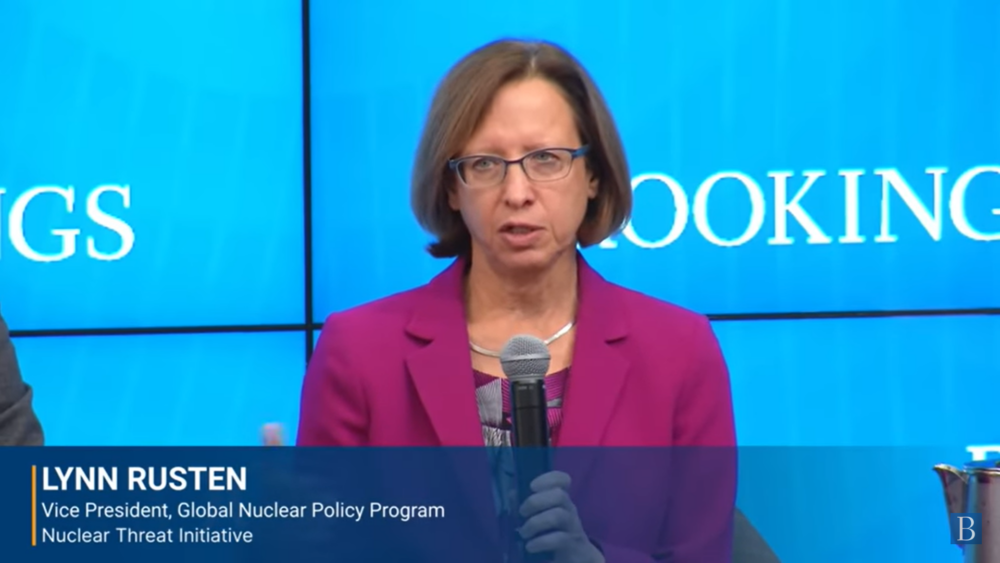
Sam Nunn
Co-Founder and Co-Chair, NTI
Nunn Urges Presidents Bush and Putin to Address Nuclear Dangers
New RAND Report Warns of Accidental or Unauthorized Nuclear Weapons Launch and Recommends Actions to Enhance Nuclear Safety
Former Senator Sam Nunn, co-chairman of the Nuclear Threat Initiative (NTI), today called for urgent action to address the increased danger of an accidental or unauthorized launch of a nuclear weapon between the United States and Russia. Nunn made the comments while releasing a new report by the RAND Corporation that warns those risks are too high, despite the agreement reached between the United States and Russia in the Treaty of Moscow.
The report, “Beyond the Nuclear Shadow: A Phased Approach for Improving Nuclear Safety and U.S. – Russian Relations,” by David E. Mosher, Lowell H. Schwartz, David R. Howell and Lynn E. Davis, says nuclear weapons continue to play a role that is out of proportion with other aspects of that relationship. According to the report, a combination of the following three factors increase the risk of accidental or unauthorized nuclear launch:
The authors recommend a phased approach with a series of immediate, near-term and longer-term measures designed to reduce the risk of accidental or unauthorized use of nuclear weapons, with the long-term goal being to eliminate the importance of nuclear weapons in the relationship altogether. The report was commissioned by NTI.
“I think there is a fundamental question that Presidents Bush and Putin need to discuss when they meet later this month: Given the U.S.-Russian relationship today – 12 years after the end of the Cold War – what requires us to continue to live with the risk of an accidental or unauthorized nuclear launch? The answer would appear largely circular: As long as Russia can launch nuclear ballistic missiles on short notice against the United States, the United States must maintain a similar capability against Russia. And vice versa,” Senator Nunn said. “During the Cold War, our weapons were in support of our policy – deterring a hostile Soviet Union against both nuclear and conventional threats. Today, Presidents Bush and Putin must ask the question: Are our weapons driving our policy? Have the machines taken over? We must have Presidential leadership to reduce these dangers.”
“To address the risk of accidental and unauthorized use of nuclear weapons, we recommend that the United States and Russia establish a “Nuclear Safety Initiative” based on the premise that nuclear safety, www.nti.org U.S-Russian relations, and U.S. security more broadly are inextricably linked,” said David Mosher from the RAND Corporation. “Only a sustained and coordinated effort can solve this problem, and it must start with strong Presidential leadership and commitment by both countries.”
“I started the Nuclear Threat Initiative when I realized that the nuclear dangers did not end with the Cold War,” said NTI co-chairman and founder Ted Turner. “This report shows that even with the new Treaty of Moscow, we will continue living with these dangers for yet another ten years and, in fact, into the indefinite future. We can do better than that. And the RAND report shows why we must.”
President Bush has committed to reducing both the numbers and danger from the hair-trigger status of U.S. – Russian nuclear forces. In a speech given in May 2000, then-Governor Bush said, “Almost a decade after the end of the Cold War, our nuclear policy still resides in that already distant past … The United States should remove as many weapons as possible from high-alert, hair-trigger status – another unnecessary vestige of Cold War confrontation. Preparation for quick launch – within minutes after warning of an attack – was the rule during the era of superpower rivalry. But today, for two nations at peace, keeping so many weapons on high alert may create unacceptable risks of accidental or unauthorized launch.”
Key findings of the RAND report
The RAND report recommends that the United States and Russia take a phased approach to the problem of nuclear safety, one that starts with immediate unilateral actions and commitments by the United States that are designed to demonstrate its seriousness in improving relations and nuclear safety. Further steps would be taken as relations improve and as the importance of nuclear weapons in the relationship recedes.
RAND is a nonprofit, non-partisan institution that helps improve policy and decision making through research and analysis. The Nuclear Threat Initiative is a charitable organization working to reduce the threats from nuclear, biological and chemical weapons. NTI brings together people with different ideological views around a common ground mission focused on immediate actions to close the gap between the global threats and global response. Co-chaired by CNN founder Ted Turner and former Senator Sam Nunn, NTI is governed by an international Board of Directors with members from nine countries.
###
Sign up for our newsletter to get the latest on nuclear and biological threats.
The DoD’s new CWMD strategy, last updated in 2014, comes at a time when longstanding norms against nuclear use are being tested.
The paper highlights the need for renewed attention to the catastrophic effects of nuclear conflict as a crucial step toward reducing the risk of nuclear use.
A new report from NTI highlights the critical need for a global diplomatic approach to address growing cyber risks, including, where possible, through cooperation between the United States and Russia.


